Contents
- 1 Facts about Surah Nuh
- 2 Arabic Text and Translation of Surah Nuh
- 3 Content of Surah Nuh
- 4 Surah Noah in a nutshell
- 5 Lessons to learn from Surah Nuh
- 6 Noah’s Final Supplication in Surah Nuh
- 7 Surah Nuh Benefits
- 8 Surah Nuh in the Quran and Narrations
- 9 Birthplace
- 10 Family Tree
- 11 Noah’s Lifespan
- 12 Sons of Noah
- 13 Wives of Noah in Islam
- 14 Noah’s Ark
- 15 Does Surah Nuh Talk About The Prophet After Noah?
- 16 Tomb of Noah
Surah Nuh is 71th both in the order of revelation to Prophet Muhammad (ṣ) and its position in the Quran. This chapter is in juz’ 29 of the Quran and is among the Mufaṣṣalāt, meaning the short chapters of the Quran. The surah is called Nuh as it contains the story of Noah (‘a) where it depicts the lifelong struggles of this messenger of Allah with the disbelievers and finally the fate of the evildoers.
Facts about Surah Nuh
Surah Nuh is 71th both in the order of revelation to Prophet Muhammad (ṣ) and its position in the Quran.
This chapter is in juz’ 29 of the Quran and is among the Mufaṣṣalāt, meaning the short chapters of the Quran.
The surah is called Nuh as it contains the story of Noah (‘a) where it depicts the lifelong struggles of this
messenger of Allah with the disbelievers and finally the fate of the evildoers.
Surah no.
71
Place
Makki/Madani
Makki
Order of revelation
71
No. of verses
28
No. of words
227
No. of letters
965
Arabic Text and Translation of Surah Nuh
بِسْمِ ٱللَّهِ ٱلرَّحْمَٰنِ ٱلرَّحِيم
In the name of Allah, the most compassionate, most merciful
إِنَّآ أَرْسَلْنَا نُوحًا إِلَىٰ قَوْمِهِۦٓ أَنْ أَنذِرْ قَوْمَكَ مِن قَبْلِ أَن يَأْتِيَهُمْ عَذَابٌ أَلِيمٌ ﴿1﴾
We sent Noah to his People (with the Command): “Do thou warn thy People before there comes to them a grievous Chastisement.”
قَالَ يَٰقَوْمِ إِنِّى لَكُمْ نَذِيرٌ مُّبِين ﴿2﴾
He said: “O my People! I am to you a Warner, clear and open:
أَنِ ٱعْبُدُوا۟ ٱللَّهَ وَٱتَّقُوهُ وَأَطِيعُونِ ﴿3﴾
That ye should worship Allah, fear Him and obey me:
يَغْفِرْ لَكُم مِّن ذُنُوبِكُمْ وَيُؤَخِّرْكُمْ إِلَىٰٓ أَجَلٍ مُّسَمًّى ۚ إِنَّ أَجَلَ ٱللَّهِ إِذَا جَآءَ لَا يُؤَخَّرُ ۖ لَوْ كُنتُمْ تَعْلَمُونَ ﴿4﴾
So He may forgive you your sins and give you respite for a stated Term: for when the Term given by Allah is accomplished, it cannot be put forward: if ye only knew.””
قَالَ رَبِّ إِنِّى دَعَوْتُ قَوْمِى لَيْلًا وَنَهَارًا ﴿5﴾
He said: “O my Lord! I have called to my People night and day:
فَلَمْ يَزِدْهُمْ دُعَآءِىٓ إِلَّا فِرَارًا ﴿6﴾
But my call only increases (their) flight (from the Right).
وَإِنِّى كُلَّمَا دَعَوْتُهُمْ لِتَغْفِرَ لَهُمْ جَعَلُوٓا۟ أَصَٰبِعَهُمْ فِىٓ ءَاذَانِهِمْ وَٱسْتَغْشَوْا۟ ثِيَابَهُمْ وَأَصَرُّوا۟ وَٱسْتَكْبَرُوا۟ ٱسْتِكْبَارًا ﴿7﴾
And every time I have called to them, that Thou mightest forgive them, they have (only) thrust their fingers into their ears, covered themselves up with their garments, grown obstinate, and given themselves up to arrogance.
ثُمَّ إِنِّى دَعَوْتُهُمْ جِهَارًا ﴿8﴾
So I have called to them aloud;
ثُمَّ إِنِّىٓ أَعْلَنتُ لَهُمْ وَأَسْرَرْتُ لَهُمْ إِسْرَارًا ﴿9﴾
Further I have spoken to them in public and secretly in private,
فَقُلْتُ ٱسْتَغْفِرُوا۟ رَبَّكُمْ إِنَّهُۥ كَانَ غَفَّارًا ﴿10﴾
Saying: Ask forgiveness from your Lord; for He is Oft-Forgiving;
يُرْسِلِ ٱلسَّمَآءَ عَلَيْكُم مِّدْرَارًا ﴿11﴾
He will send rain to you in abundance;
وَيُمْدِدْكُم بِأَمْوَٰلٍ وَبَنِينَ وَيَجْعَل لَّكُمْ جَنَّٰتٍ وَيَجْعَل لَّكُمْ أَنْهَٰرًا ﴿12﴾
Give you increase in wealth and sons; and bestow on you gardens and bestow on you rivers (of flowing water).
مَّا لَكُمْ لَا تَرْجُونَ لِلَّهِ وَقَارًا ﴿13﴾
What is the matter with you, that ye are not conscious of Allah’s majesty,-
وَقَدْ خَلَقَكُمْ أَطْوَارًا ﴿14﴾
Seeing that it is He that has created you in diverse stages?
أَلَمْ تَرَوْا۟ كَيْفَ خَلَقَ ٱللَّهُ سَبْعَ سَمَٰوَٰتٍ طِبَاقًا ﴿15﴾
See ye not how Allah has created the seven heavens one above another,
وَجَعَلَ ٱلْقَمَرَ فِيهِنَّ نُورًا وَجَعَلَ ٱلشَّمْسَ سِرَاجًا ﴿16﴾
And made the moon a light in their midst, and made the sun as a (Glorious) Lamp?
وَٱللَّهُ أَنۢبَتَكُم مِّنَ ٱلْأَرْضِ نَبَاتًا ﴿17﴾
And Allah has produced you from the earth growing (gradually),
ثُمَّ يُعِيدُكُمْ فِيهَا وَيُخْرِجُكُمْ إِخْرَاجًا ﴿18﴾
And in the End He will return you into the (earth), and raise you forth (again at the Resurrection).
وَٱللَّهُ جَعَلَ لَكُمُ ٱلْأَرْضَ بِسَاطًا ﴿19﴾
And Allah has made the earth for you as a carpet (spread out),
لِّتَسْلُكُوا۟ مِنْهَا سُبُلًا فِجَاجًا ﴿20﴾
That ye may go about therein, in spacious roads.”
قَالَ نُوحٌ رَّبِّ إِنَّهُمْ عَصَوْنِى وَٱتَّبَعُوا۟ مَن لَّمْ يَزِدْهُ مَالُهُۥ وَوَلَدُهُۥٓ إِلَّا خَسَارًا ﴿21﴾
Noah said, “O my Lord! They have disobeyed me, but they follow (men) whose wealth and children give them no Increase but only Loss.
وَمَكَرُوا۟ مَكْرًا كُبَّارًا ﴿22﴾
And they have devised a tremendous Plot.
وَقَالُوا۟ لَا تَذَرُنَّ ءَالِهَتَكُمْ وَلَا تَذَرُنَّ وَدًّا وَلَا سُوَاعًا وَلَا يَغُوثَ وَيَعُوقَ وَنَسْرًا ﴿23﴾
And they have said (to each other), ‘Abandon not your gods: Abandon neither Wadd nor Suwā‘, neither Yaghūth nor Ya‘ūq, nor Nas’;-
وَقَدْ أَضَلُّوا۟ كَثِيرًا ۖ وَلَا تَزِدِ ٱلظَّٰلِمِينَ إِلَّا ضَلَٰلًا ﴿24﴾
They have already misled many; and grant Thou no increase to the wrong- doers but in straying (from their mark).
مِّمَّا خَطِيٓـَٰٔتِهِمْ أُغْرِقُوا۟ فَأُدْخِلُوا۟ نَارًا فَلَمْ يَجِدُوا۟ لَهُم مِّن دُونِ ٱللَّهِ أَنصَارًا ﴿25﴾
Because of their sins they were drowned (in the flood), and were made to enter the Fire: and they found—in lieu of Allah—none to help them.
وَقَالَ نُوحٌ رَّبِّ لَا تَذَرْ عَلَى ٱلْأَرْضِ مِنَ ٱلْكَٰفِرِينَ دَيَّارًا ﴿26﴾
And Noah, said: “O my Lord! Leave not of the Unbelievers, a single one on earth!
إِنَّكَ إِن تَذَرْهُمْ يُضِلُّوا۟ عِبَادَكَ وَلَا يَلِدُوٓا۟ إِلَّا فَاجِرًا كَفَّارًا ﴿27﴾
For, if Thou dost leave (any of) them, they will but mislead Thy devotees, and they will breed none but wicked ungrateful ones.
رَّبِّ ٱغْفِرْ لِى وَلِوَٰلِدَىَّ وَلِمَن دَخَلَ بَيْتِىَ مُؤْمِنًا وَلِلْمُؤْمِنِينَ وَٱلْمُؤْمِنَٰتِ وَلَا تَزِدِ ٱلظَّٰلِمِينَ إِلَّا تَبَارًۢ ﴿28﴾
O my Lord! Forgive me, my parents, all who enter my house in Faith, and (all) believing men and believing women: and to the wrong-doers grant Thou no increase but in perdition!”
- Facts about Surah Nuh
- Arabic Text and Translation of Surah Nuh
- Content of Surah Nuh
- Surah Noah in a nutshell
- Lessons to learn from Surah Nuh
- Noah’s Final Supplication in Surah Nuh
- Surah Nuh Benefits
- Surah Nuh in the Quran and Narrations
- Birthplace
- Family Tree
- Noah’s Lifespan
- Sons of Noah
- Wives of Noah in Islam
- Noah’s Ark
- Does Surah Nuh Talk About The Prophet After Noah?
- Tomb of Noah
Content of Surah Nuh
Surah Nuh is one of the historical accounts related by the Quran that was revealed to Prophet Muhammad (S) at the time he was living in Mecca. Islam was still young and the number of believers were few. The holy Prophet (S) was under pressure by the disbelievers of Mecca as they were persecuting the new believers. In such an atmosphere of tension and hardship, God tells his prophet (S) that he is not alone and relates the story of Noah. There are many similarities between the people at the time of the two prophets of God, Muhammad and Noah. The story of our time is not that different. The outward appearance might seem different but its spirit is the same. Let us have a look at the sequence of events in the story of Prophet Noah (‘a).
Surah Noah in a nutshell
- The story begins:
A bitter event is to happen; but wait … There is still hope. A messenger is sent to this group. - Noah speaks directly to his people and then to God: (2-13)
- “I come to warn you of the bitter event.”
- Crystal clear guidance No ambiguity.
- What is the way out?
- Ask forgiveness
- Worship Allah
- Be wary of Him
- Obey me.
- Result?
- Forgiveness of sins
- Longer life
- Rain
- Wealth, children, gardens, and rivers
- Noah’s proof of God: (14-20)
- Man’s creation in stages
- Seven heavens
- Moon as light and sun as lamp
- Origin of man: from earth
- End: return to earth
- Destination: Resurrection and final abode
- Earth, a carpet for comfortable life
- Most of his people do not believe; Noah complains of his people to God: (21-24)
- Destiny of Noah’s people: (25)
- Drowned in this world
- Hellfire in the next world
- Noah’s curse for his people and supplication for the believers (26-28)
Lessons to learn from Surah Nuh
In Islam there are two concepts called Tabarrā (expressing of disassociation and disavowal with the enemies of God) and Tawallā (expressing love for and association with God and His friends). You cannot stand in the mid path undecided of what you believe in. You either have to be with God and His friends or His enemies.
In the world we live in, there are those who support the truth and those against the truth, oppressing people, causing corruption on earth and usurping other’s rights. Which side are we on? We cannot say that we are against oppression yet love all people, even the oppressors, which simply means that we are advocating injustice and tyranny at the same time.
The prophets came to…
The whole purpose of the mission of prophets of God was to guide people to justice and warn them against treading the path of oppression. That is why we say ten times in our daily prayers “Keep us on the right path. The path of those upon whom Thou hast bestowed favors; not (the path) of those upon whom Thy wrath is brought down, nor of those who go astray.” (Surah Hamd, 6-7)
Noah’s Final Supplication in Surah Nuh
Prophet Noah (‘a) struggled 950 years to guide his people to the truth. He instructed them to repent, ask for forgiveness, and follow the right path but to no avail. The final verse of Surah Nuh is a prayer of Nuh showing his Tawallā and Tabarrā. He associates himself with four groups of people and asks for forgiveness from Allah for them. He says:
“O my Lord! Forgive:
- me,
- my parents,
- all who enter my house in Faith,
- and (all) believing men and believing women.”
The prayer does not end here. He concludes by claiming his disassociation with the wrongdoers and curses them: “And to the wrongdoers grant Thou no increase but in punishment!”
Surah Nuh Benefits
- Based on a narration from Prophet Muhammad (ṣ), one who reads surah Nuh will be considered among the believers having received Prophet Nuh’s invitation and prayer. 1
- The other merit of the recitation of surah Nuh is to be given a lofty position in paradise among the righteous and be granted three gardens in the final abode. Note that one’s intention has to be purely for God and the surah has to be recited with patience in obligatory and recommended prayers.
- Other benefits such as more wealth and children and the granting of one’s requests are also mentioned.
Surah Nuh in the Quran and Narrations
| Also Written | Noah son of Lamech |
| Born in | Mesopotamia; Kufa, Iraq. |
| Age | 1700, 2500, or 2700 years |
| Years guiding people | 950 years |
| Predecessor | Enoch (ادریس) |
| Successor | Shem (سام) |
| Wife | Wāli‘ah (والعة), and Emzara ( عمذرة or عمورة) |
| Children | Shem, Ham, Canaan (Yam), and Japheth |
| Tomb of Noah | Najaf, Iraq, Imam Ali Shrine |
Noah, son of Lamech, is one of the most revered prophets in Abrahamic religions including Islam whose name and story has been mentioned in various surahs and ayahs of the Quran, especially in surah Hud and Nuh. He is the ancestor of the all the prophets that came after him through his son Shem.
Muslims consider Noah as one of the five great prophets known as ‘Ul al-‘Azm (أّولوا العزم), meaning prophets who had a very strong resolve. These prophets, in addition to having a high station before God, had their own Holy Scripture and religion (sharia). Noah is the first one among them with the other four in chronological order being: Abraham, Moses, Jesus, and Muhammad.
Noah is well-known for building the Ark that would save the believers and all animals from the punishment of his people for disbelieving in him. This punishment was in the form of a flood that has been mentioned in most if not all Abrahamic religious texts.
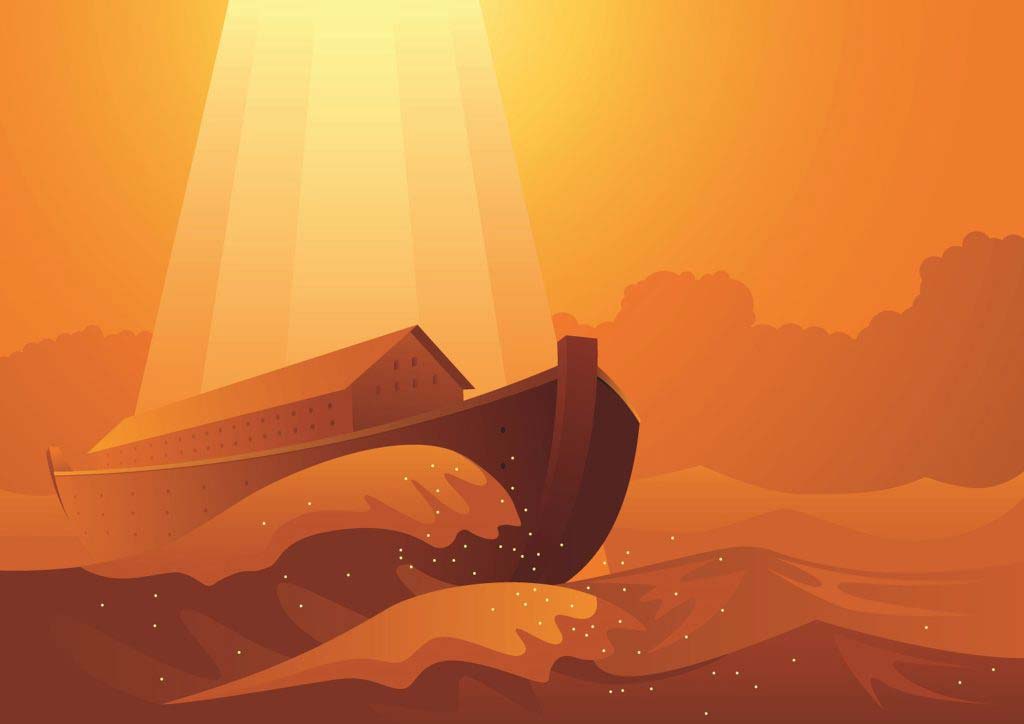
Birthplace
It is generally believed by Muslims that this prophet was born and lived in Mesopotamia, specifically in the current city of Kufa, Iraq. According to one Islamic source, he was born 126 years after the demise of Adam, and 1056 years after Adam and Eve’s fall from the Garden of Eden.2
Family Tree
Adam & Eve
Seth
Enos
Kenan
Mahalalel
Jared
Enoch
Methuselah
Lamech
Noah
Noah’s Lifespan
Noah is widely regarded as the Divine prophet and human being who lived the longest in human history. Muslim historians say Noah lived, 950, 1700, 2500, 2700, or even 2800 years. Some say that his long lifespan was itself a miracle. Shiites refer to Noah’s long lifespan to prove the long lifespan of their twelfth and last imam, Imam al-Mahdi.
Sons of Noah
There have been different records of Noah’s sons. The names of none of them have been mentioned in the Quran. The Bible reports that he had three sons, Ham (حام), Shem (سام), and Japheth (یافث). Islamic sources report that this noble prophet had another son by the name of either Canaan (کنعان) or Yam (یام). It should be noted that in the Hebrew Bible, unlike what has been stated in Islamic narrations, Canaan is known to be Ham’s son, thus Noah’s grandson and the one who was cursed by Noah.
The Fate of Canaan (Yam)
The name Canaan or Yam, the son of Noah who disbelieved, has not been mentioned in the Quran. However, its story has been mentioned in surah Hud.3 Canaan rejected his father’s call to board the Ark, saying that he will climb a mountain so that he would be safe.4 However, even mountains were covered by the Flood and Canaan drowned as well.
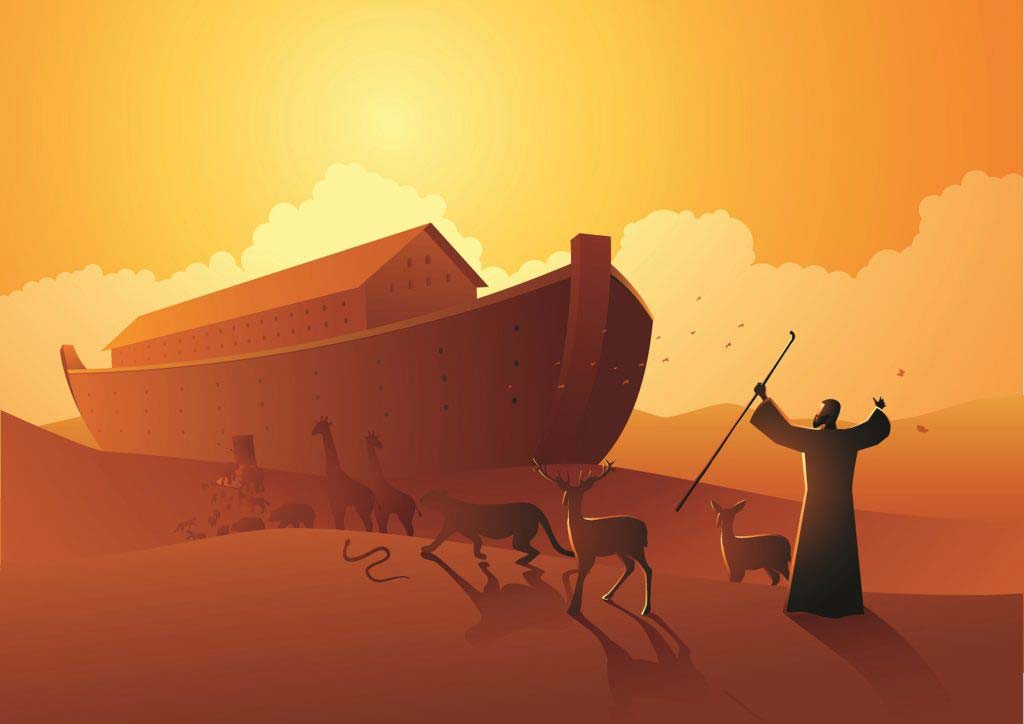
Shem
Islamic narrations such as one by Imam al-Rida 5 report that he was the vicegerent, successor to his father, and a mursal (i.e. a prophet who preaches the religion of a previous prophet). The lineage of all prophets after Noah descends from Shem including the two great prophets Abraham and Muhammad.
Ham and Japheth
As for Noah’s two sons Ham and Japheth, certain narratives have been mentioned mostly by Sunni sources (such as Jāmi‘ al-Bayān fī Tafsīr al-Qur’ān) under the commentary of some ayahs of the Quran about Noah, as well as one narration by Imam Ali Hadi al-Naqi,6 which somewhat resembles the narrative of the curse of Ham mentioned in the Bible. However, these narrations do not say anything about the drunkenness of Noah like the Bible does, among some other differences.
Noah Curses Ham and Japheth
According to the narration by Imam Hadi, Noah was sleeping in the Ark when a wind blew and his garment went aside and Noah’s naked body was revealed. Ham and Japheth saw this scene and started laughing, whereas Shem forbade them from doing so and threw his father’s garment back on his body. However, they kept putting it aside and laughed more.
Noah then woke up and learned of Ham and Japheth’s doing. Therefore, he cursed them both, asking God to corrupt their progeny. There is also one narration stating that Japheth and Ham disobeyed their brother Shem after he succeeded his father.7
Wives of Noah in Islam
In Islamic history and narrations, it is said that Noah had two wives by the names of either Wāghilah (واغلة) or Wāli‘ah (والعة), and ‘Amzarah or ‘Amurah (عمذرة or عمورة) whose name is probably Emzara that is mentioned in some Jewish sources.8 Emzara was a righteous and believing woman and the mother of Shem, Ham, and Japheth according to some Muslim historians. On the other hand, Wali‘ah, who was the mother of Canaan (Yam), disbelieved and was disobedient to her husband 9 and did not board the Ark and suffered the same fate as her son.
On the other hand, Jews and Christians raise the possibility that a woman named Naamah was Noah’s only wife as stated in the Book of Jasher 5:15. As can be noticed, there is a great deal of mystery surrounding the number and names of the wife or wives of Noah notably in Islamic and Jewish religious texts.
Noah’s Ark
The story of the building of the Ark and the boarding of believers and all animals is not mentioned in surah Nuh. However, surah Hud provides a detailed account of this event. God informed Noah about the punishment of his people and commanded him to build the Ark so that believers and animals would be safe from the Flood.
Noah spent years building the Ark. Meanwhile, his people mocked him, saying, “Have you become a carpenter, now?” They also ridiculed him because the place where he was building the Ark was dry land and far away from a body of water. Muslim historians say that Noah built the Ark in the same place he lived, that is, Mesopotamia, specifically in the current city of Kufa, Iraq.
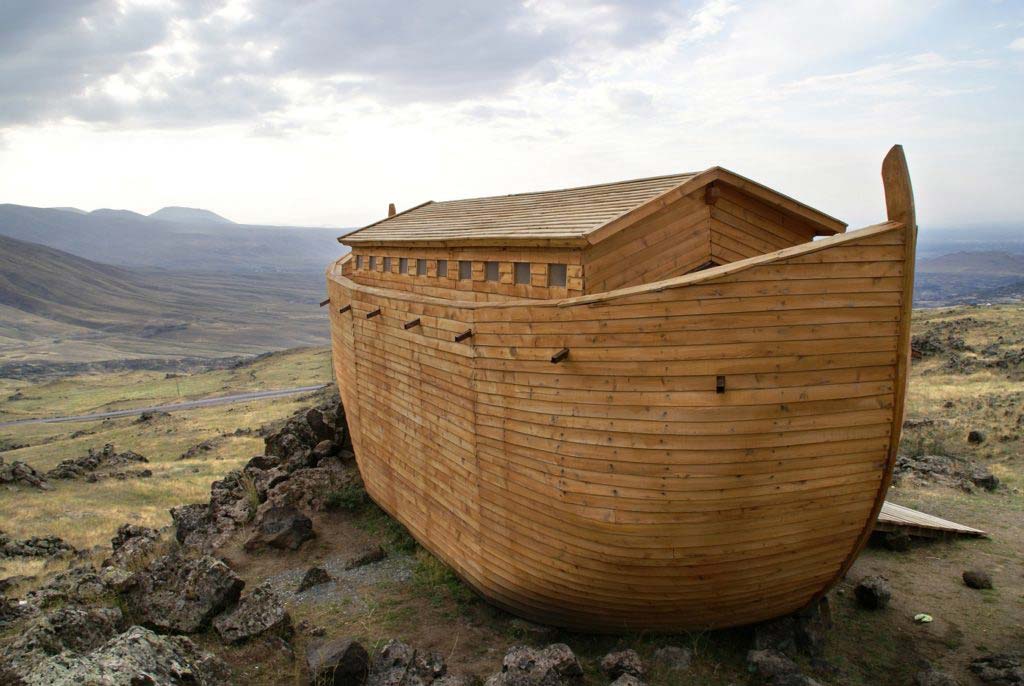
The Ark Sets Sail
After the Ark was built, God commanded Noah, as stated in surah Hud ayah 40, to “carry in it a pair of every kind [of animal], along with your family—except those [of them] against whom the edict has already been given—and those who have faith.”10 Then the Flood came and all those who disbelieved were drowned, including one of Noah’s sons and one of his wives who had transgressed.11
Allah then commanded the water to recede on the earth and the sky to cease raining and the Ark settled atop Mount Judi after which Allah warned His noble prophet against the disbelievers and wrongdoers and gave him glad tidings of a new beginning.12
Does Surah Nuh Talk About The Prophet After Noah?
Even though Shem is considered as his successor and a prophet who continued preaching his religion, there was a more prominent prophet that came after Noah according to the Quran and Islamic sources by the name of Hud, whose name has been mentioned ten times in the Quran and a surah exists by his name (surah Hud). Hud can possibly be identified as Eber in Jewish and Christian tradition as mentioned in the Book of Genesis.13 Hud is also known as the father of Arabs.14
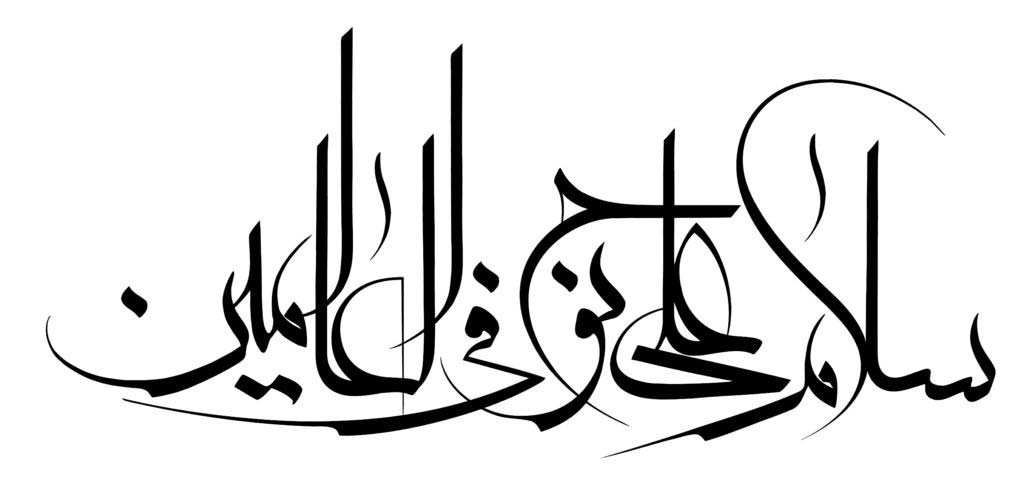
Tomb of Noah
There are several places that have been attributed to the tomb of Noah including: a mausoleum in Nakhchivan; a place known as Karak Nuh in Lebanon; Cizre, Turkey; and Najaf, Iraq. Shiites and some Sunnites believe that his tomb is located in the city of Najaf, Iraq, in the holy shrine of the Commander of the Faithful, Imam Ali (‘a), the first Shiite Imam and the successor to Prophet Muhammad (ṣ). A passage of the ziyarat of Imam Ali indicating this reads:
“Peace be on you and on the ones neighboring your grave, Adam and Noah.”
One narration quotes the sixth Shiite Imam, Ja‘far al-Ṣādiq as saying, “Whenever you do ziyarat of Imam Ali, you should know that you have also done ziyarat of Adam and Noah.” 15
References
- Majma‘ al-Bayān, vol. 10, p. 359.
- Tārīkh Ṭabarī.
- Quran 11:43.
- Ibid.
- Sheikh Ṣadūq, ‘Uyūn Akhbār al-Riḍā.
- Sheikh Ṣadūq, ‘Ilal al-Sharā‘, vol. 1, p. 32.
- Mas‘ūdī, ‘Alī ibn Ḥusayn, Ithbāt al-Waṣiyyat li al-Imām ‘Alī ibn Abī Ṭālib, p. 33.
- The name Emzara has been mentioned in the non-canonical Jewish work known as the Book of Jubilees 4:33.
- Cf. Quran 66:10.
- Quran 11:40, English translation of the Quran by Ali Quli Qarai.
- Quran 11:43
- Quran 11:48.
- Wensinck, A. J., “Hūd”, in: Encyclopaedia of Islam, First Edition (1913-1936), Edited by M. Th. Houtsma, T.W. Arnold, R. Basset, R. Hartmann.
- Buhl, Fr., “Ḏj̲urhum”, in: Encyclopaedia of Islam, First Edition (1913-1936), Edited by M. Th. Houtsma, T.W. Arnold, R. Basset, R. Hartmann.
- Ṭūsī, Tahdhīb al-Aḥkām, vol. 6, p. 6, hadith 23.

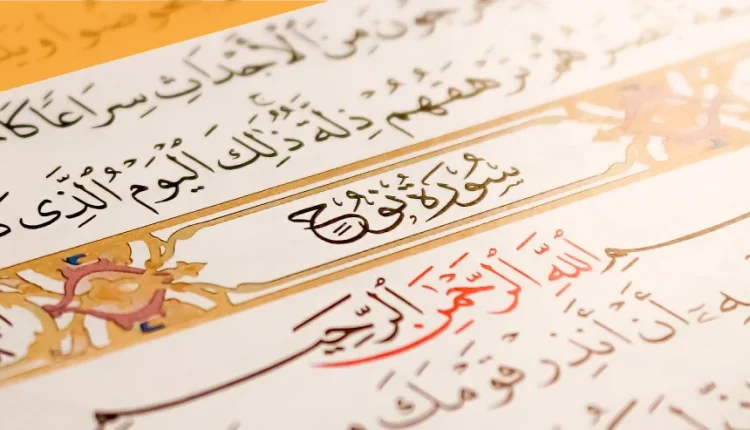


This is very helpful JazakAllah Khair May Allah bless you.